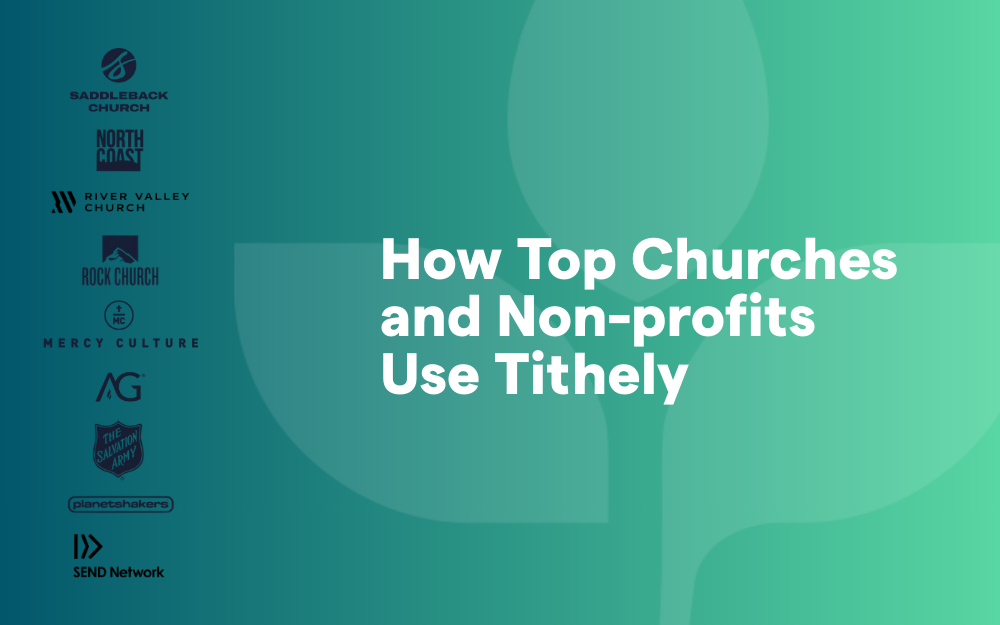Financial Transparency in Ministry: Best Practices for Churches of All Sizes
Financial transparency in ministry is a critical aspect that underpins trust, accountability, and effective stewardship within the church community.

Financial transparency in ministry is a critical aspect that underpins trust, accountability, and effective stewardship within the church community. In a time where financial scandals and mismanagement can erode the faith of congregants, ensuring openness in financial matters is essential.
We'll examine church financial transparency and its importance and provide best practices for churches of all sizes.
By adopting transparent financial practices, churches safeguard their reputation. They foster a sense of shared responsibility and trust among their members, paving the way for sustainable growth and mission fulfillment.
What Is Church Financial Transparency?
Church financial transparency refers to openly and honestly sharing information about the finances of a church with its members, donors, and the public. This includes all aspects of financial management, such as income, expenses, budgeting, and investments.
Financial transparency ensures that all members and stakeholders clearly understand how the church's money is being used. It involves providing timely and accurate church financial reports, making information easily accessible, and being open to questions and feedback from the community.
Why Is Financial Transparency Important in Ministry?
Building Trust
Transparency builds trust within the church community. When members feel they have a clear understanding of their church's financial situation, they are more likely to trust its leadership. On the other hand, when church finances are opaque to members, they are more likely to become suspicious of how their tithes and offerings are being used.
Enhancing Accountability
Financial transparency also enhances accountability among church leaders and staff. When financial activities are openly shared, it fosters a culture of responsibility where leaders are held accountable for their financial decisions, reducing the likelihood of mismanagement or misuse of funds and solidifying the trust between church members and their leaders.
Informed Decision-Making
When church finances are transparent, members and leaders can make more informed decisions about projects, initiatives, and investments. Access to complete and accurate financial information enables effective resource planning and prioritization.
This collaborative approach ensures that the community is an active participant in the church's financial health, further strengthening the trust between the congregation and its leadership.
Promoting Generosity and Stewardship
Another way transparency fosters trust is by promoting a culture of generosity and stewardship. When members see how their financial contributions make a tangible difference, they are more likely to continue giving and even increase their donations.
Transparency highlights the impact of their generosity, showcasing the successful programs, events, and outreach efforts made possible through their support.
Legal Compliance and Ethical Standards
Transparency in church finances also ensures legal compliance and adherence to ethical standards. By openly sharing financial information, churches demonstrate accountability to government regulations and ethical codes of conduct. This transparency helps protect the organization from potential legal issues while maintaining a solid reputation within the community.
Encouraging Open Communication
Lastly, financial transparency encourages open communication between leaders and members. When financial reports are readily available, it creates opportunities for dialogue and feedback. Church leaders can address any concerns or questions members raise, fostering a sense of inclusivity and collaboration within the community.
The bottom line is that church financial transparency is essential for every church. Without transparency, trust can break down, hindering the church's ability to fulfill its mission and purpose.
By embracing transparency, churches can promote generosity, ensure legal compliance, and encourage open communication with their members. Ultimately, this leads to a more robust and healthier community united in its commitment to serving others.
Best Practices For Financial Transparency
Now that we're on the same page regarding the importance of church financial transparency let's talk about some best practices your church should consider implementing to promote said transparency.
Define Clear Roles and Responsibilities For Financial Oversight
Start by establishing clear roles and responsibilities for overseeing the church's finances. This could include designating specific individuals to handle various financial tasks such as budgeting, bookkeeping, and auditing. Clearly defining these roles will ensure accountability and prevent any confusion or conflict down the line.
Implement A Financial Policy Manual
A financial policy manual is a crucial tool for promoting transparency in churches. This manual should outline the processes and procedures for handling finances, including church budgeting, spending, and reporting.
It should also include guidelines for managing donations and other sources of income. Church leaders can ensure consistency and compliance with legal regulations by having a well-defined financial policy in place.
Establish A Budget and Stick To It
A budget is essential for any church. It helps to plan and track expenses, set financial goals, and ensure that funds are allocated appropriately. Once a church budget is established, it's essential that you stick to it. If there are variances, these should be well-documented and explained to the congregation.
Provide Regular Financial Reports
Churches should provide regular financial reports to their members, including monthly, quarterly, and annual statements outlining the church's income and expenses. These reports should be accessible to all members and presented in an easy-to-understand format.
Members should be able to request more detailed financial reports, which should contain expense breakdowns and budget comparisons.
Financial reports promote transparency and allow members to see how their contributions are being used, allowing them to make informed decisions about giving.
Regularly Discuss Finances During Church Meetings
In addition to providing financial reports, church leaders should regularly discuss finances during church meetings. This can include updates on the budget, any upcoming expenses, or fundraising efforts.
Open communication about finances promotes transparency, allows for input from members, and fosters a sense of ownership in the financial health of the church.
Conduct Independent Audits
An independent audit is a thorough examination of a church's financial records by an outside party. It's important for maintaining accountability and ensuring compliance with legal regulations.
While audits may seem daunting, they can provide valuable insights into a church's financial practices and identify any areas in need of improvement. They also demonstrate to members that the church takes their financial responsibilities seriously.
It's crucial that the audit results be made available to the congregation. This demonstrates a commitment to transparency and helps build trust with members.
Train Church Leaders on Financial Responsibility
Church leaders are responsible for managing the church's finances, so it's important that they have a solid understanding of financial practices. They should generally understand things like budgeting, record-keeping, and proper handling of donations.
It's helpful to provide church leaders with training or resources on financial responsibility to ensure that they have the necessary skills and to relieve any potential burden from them feeling unprepared or overwhelmed in their role.
Additionally, regular communication and check-ins with church leaders can help identify any areas in need of improvement and address any concerns before
Seek Professional Advice
Churches should consider seeking professional advice when it comes to managing their finances. Whether from financial consulting with accountants or financial advisors who specialize in working with churches and non-profit organizations, these professionals can offer guidance on setting up budgets, managing funds, and complying with regulations. They can also provide valuable insights on best practices for financial management and offer support in case of any legal or compliance issues.
Implement Checks and Balances
Having checks and balances in place is crucial for maintaining financial accountability within the church. Multiple people should be involved in financial decision-making, and regular reviews and audits should be conducted. By implementing these measures, churches can prevent one person from having too much control over the church's finances (Hello, Judas!), reducing the risk of fraud or mismanagement.
Create A Financial Management Team
Churches should consider involving multiple people in financial decision-making and creating a dedicated financial management team. The team can oversee all financial matters, including budgeting, record-keeping, and compliance. With a designated team focused on financial management, the church can ensure that all aspects of its finances are properly managed and that no essential tasks or regulations are overlooked.
Foster A Culture of Stewardship
One fundamental principle of financial management in a church is stewardship. This means that all church members should view themselves as stewards, rather than owners, of the church's resources. By fostering a culture of stewardship, churches can encourage responsible and transparent financial practices among their members. This can also help to build trust and accountability within the community.
Educate Members on Financial Management
In addition to creating a culture of stewardship, churches should educate their members on financial management. These courses may involve workshops or classes on budgeting, giving, and other financial topics related to the church. Educating members can empower them to make informed decisions and participate in the financial management process. It can also help prevent misunderstandings or disagreements about finances within the church community.
Highlight The Impact of Giving
Another way to promote financial transparency in a church is to highlight the impact of giving. For example, you could share stories or testimonies of how donations have made a positive difference in the community. By showing members the tangible results of their contributions, they may be more motivated to continue giving and support the church's financial stability. It also helps members trust that their donations are being used well and are helping achieve great things.
Answer Questions Openly and Honestly
Transparency also means being open and honest with members about the church's financial decisions and addressing any questions or concerns that members may have regarding the use of funds. Open and honest communication allows churches to build trust and credibility with their members. It provides for accountability and ensures that all financial decisions are made with the church's best interest in mind.
Final Thoughts
Transparency in financial management is crucial for churches to maintain a strong and healthy community. Without transparency, trust will be eroded, the church's reputation will be damaged, and members may lose confidence in the leadership.
By implementing the above practices, churches can build trust with their members, promote responsible financial stewardship, and ultimately support the church's mission and vision.
Remember, transparency isn't ultimately about serving the members of your church, although that's a huge part of it. Ultimately, financial transparency is about honoring God and stewarding the resources He has provided.
Sign Up for Product Updates
Financial transparency in ministry is a critical aspect that underpins trust, accountability, and effective stewardship within the church community. In a time where financial scandals and mismanagement can erode the faith of congregants, ensuring openness in financial matters is essential.
We'll examine church financial transparency and its importance and provide best practices for churches of all sizes.
By adopting transparent financial practices, churches safeguard their reputation. They foster a sense of shared responsibility and trust among their members, paving the way for sustainable growth and mission fulfillment.
What Is Church Financial Transparency?
Church financial transparency refers to openly and honestly sharing information about the finances of a church with its members, donors, and the public. This includes all aspects of financial management, such as income, expenses, budgeting, and investments.
Financial transparency ensures that all members and stakeholders clearly understand how the church's money is being used. It involves providing timely and accurate church financial reports, making information easily accessible, and being open to questions and feedback from the community.
Why Is Financial Transparency Important in Ministry?
Building Trust
Transparency builds trust within the church community. When members feel they have a clear understanding of their church's financial situation, they are more likely to trust its leadership. On the other hand, when church finances are opaque to members, they are more likely to become suspicious of how their tithes and offerings are being used.
Enhancing Accountability
Financial transparency also enhances accountability among church leaders and staff. When financial activities are openly shared, it fosters a culture of responsibility where leaders are held accountable for their financial decisions, reducing the likelihood of mismanagement or misuse of funds and solidifying the trust between church members and their leaders.
Informed Decision-Making
When church finances are transparent, members and leaders can make more informed decisions about projects, initiatives, and investments. Access to complete and accurate financial information enables effective resource planning and prioritization.
This collaborative approach ensures that the community is an active participant in the church's financial health, further strengthening the trust between the congregation and its leadership.
Promoting Generosity and Stewardship
Another way transparency fosters trust is by promoting a culture of generosity and stewardship. When members see how their financial contributions make a tangible difference, they are more likely to continue giving and even increase their donations.
Transparency highlights the impact of their generosity, showcasing the successful programs, events, and outreach efforts made possible through their support.
Legal Compliance and Ethical Standards
Transparency in church finances also ensures legal compliance and adherence to ethical standards. By openly sharing financial information, churches demonstrate accountability to government regulations and ethical codes of conduct. This transparency helps protect the organization from potential legal issues while maintaining a solid reputation within the community.
Encouraging Open Communication
Lastly, financial transparency encourages open communication between leaders and members. When financial reports are readily available, it creates opportunities for dialogue and feedback. Church leaders can address any concerns or questions members raise, fostering a sense of inclusivity and collaboration within the community.
The bottom line is that church financial transparency is essential for every church. Without transparency, trust can break down, hindering the church's ability to fulfill its mission and purpose.
By embracing transparency, churches can promote generosity, ensure legal compliance, and encourage open communication with their members. Ultimately, this leads to a more robust and healthier community united in its commitment to serving others.
Best Practices For Financial Transparency
Now that we're on the same page regarding the importance of church financial transparency let's talk about some best practices your church should consider implementing to promote said transparency.
Define Clear Roles and Responsibilities For Financial Oversight
Start by establishing clear roles and responsibilities for overseeing the church's finances. This could include designating specific individuals to handle various financial tasks such as budgeting, bookkeeping, and auditing. Clearly defining these roles will ensure accountability and prevent any confusion or conflict down the line.
Implement A Financial Policy Manual
A financial policy manual is a crucial tool for promoting transparency in churches. This manual should outline the processes and procedures for handling finances, including church budgeting, spending, and reporting.
It should also include guidelines for managing donations and other sources of income. Church leaders can ensure consistency and compliance with legal regulations by having a well-defined financial policy in place.
Establish A Budget and Stick To It
A budget is essential for any church. It helps to plan and track expenses, set financial goals, and ensure that funds are allocated appropriately. Once a church budget is established, it's essential that you stick to it. If there are variances, these should be well-documented and explained to the congregation.
Provide Regular Financial Reports
Churches should provide regular financial reports to their members, including monthly, quarterly, and annual statements outlining the church's income and expenses. These reports should be accessible to all members and presented in an easy-to-understand format.
Members should be able to request more detailed financial reports, which should contain expense breakdowns and budget comparisons.
Financial reports promote transparency and allow members to see how their contributions are being used, allowing them to make informed decisions about giving.
Regularly Discuss Finances During Church Meetings
In addition to providing financial reports, church leaders should regularly discuss finances during church meetings. This can include updates on the budget, any upcoming expenses, or fundraising efforts.
Open communication about finances promotes transparency, allows for input from members, and fosters a sense of ownership in the financial health of the church.
Conduct Independent Audits
An independent audit is a thorough examination of a church's financial records by an outside party. It's important for maintaining accountability and ensuring compliance with legal regulations.
While audits may seem daunting, they can provide valuable insights into a church's financial practices and identify any areas in need of improvement. They also demonstrate to members that the church takes their financial responsibilities seriously.
It's crucial that the audit results be made available to the congregation. This demonstrates a commitment to transparency and helps build trust with members.
Train Church Leaders on Financial Responsibility
Church leaders are responsible for managing the church's finances, so it's important that they have a solid understanding of financial practices. They should generally understand things like budgeting, record-keeping, and proper handling of donations.
It's helpful to provide church leaders with training or resources on financial responsibility to ensure that they have the necessary skills and to relieve any potential burden from them feeling unprepared or overwhelmed in their role.
Additionally, regular communication and check-ins with church leaders can help identify any areas in need of improvement and address any concerns before
Seek Professional Advice
Churches should consider seeking professional advice when it comes to managing their finances. Whether from financial consulting with accountants or financial advisors who specialize in working with churches and non-profit organizations, these professionals can offer guidance on setting up budgets, managing funds, and complying with regulations. They can also provide valuable insights on best practices for financial management and offer support in case of any legal or compliance issues.
Implement Checks and Balances
Having checks and balances in place is crucial for maintaining financial accountability within the church. Multiple people should be involved in financial decision-making, and regular reviews and audits should be conducted. By implementing these measures, churches can prevent one person from having too much control over the church's finances (Hello, Judas!), reducing the risk of fraud or mismanagement.
Create A Financial Management Team
Churches should consider involving multiple people in financial decision-making and creating a dedicated financial management team. The team can oversee all financial matters, including budgeting, record-keeping, and compliance. With a designated team focused on financial management, the church can ensure that all aspects of its finances are properly managed and that no essential tasks or regulations are overlooked.
Foster A Culture of Stewardship
One fundamental principle of financial management in a church is stewardship. This means that all church members should view themselves as stewards, rather than owners, of the church's resources. By fostering a culture of stewardship, churches can encourage responsible and transparent financial practices among their members. This can also help to build trust and accountability within the community.
Educate Members on Financial Management
In addition to creating a culture of stewardship, churches should educate their members on financial management. These courses may involve workshops or classes on budgeting, giving, and other financial topics related to the church. Educating members can empower them to make informed decisions and participate in the financial management process. It can also help prevent misunderstandings or disagreements about finances within the church community.
Highlight The Impact of Giving
Another way to promote financial transparency in a church is to highlight the impact of giving. For example, you could share stories or testimonies of how donations have made a positive difference in the community. By showing members the tangible results of their contributions, they may be more motivated to continue giving and support the church's financial stability. It also helps members trust that their donations are being used well and are helping achieve great things.
Answer Questions Openly and Honestly
Transparency also means being open and honest with members about the church's financial decisions and addressing any questions or concerns that members may have regarding the use of funds. Open and honest communication allows churches to build trust and credibility with their members. It provides for accountability and ensures that all financial decisions are made with the church's best interest in mind.
Final Thoughts
Transparency in financial management is crucial for churches to maintain a strong and healthy community. Without transparency, trust will be eroded, the church's reputation will be damaged, and members may lose confidence in the leadership.
By implementing the above practices, churches can build trust with their members, promote responsible financial stewardship, and ultimately support the church's mission and vision.
Remember, transparency isn't ultimately about serving the members of your church, although that's a huge part of it. Ultimately, financial transparency is about honoring God and stewarding the resources He has provided.
podcast transcript
Financial transparency in ministry is a critical aspect that underpins trust, accountability, and effective stewardship within the church community. In a time where financial scandals and mismanagement can erode the faith of congregants, ensuring openness in financial matters is essential.
We'll examine church financial transparency and its importance and provide best practices for churches of all sizes.
By adopting transparent financial practices, churches safeguard their reputation. They foster a sense of shared responsibility and trust among their members, paving the way for sustainable growth and mission fulfillment.
What Is Church Financial Transparency?
Church financial transparency refers to openly and honestly sharing information about the finances of a church with its members, donors, and the public. This includes all aspects of financial management, such as income, expenses, budgeting, and investments.
Financial transparency ensures that all members and stakeholders clearly understand how the church's money is being used. It involves providing timely and accurate church financial reports, making information easily accessible, and being open to questions and feedback from the community.
Why Is Financial Transparency Important in Ministry?
Building Trust
Transparency builds trust within the church community. When members feel they have a clear understanding of their church's financial situation, they are more likely to trust its leadership. On the other hand, when church finances are opaque to members, they are more likely to become suspicious of how their tithes and offerings are being used.
Enhancing Accountability
Financial transparency also enhances accountability among church leaders and staff. When financial activities are openly shared, it fosters a culture of responsibility where leaders are held accountable for their financial decisions, reducing the likelihood of mismanagement or misuse of funds and solidifying the trust between church members and their leaders.
Informed Decision-Making
When church finances are transparent, members and leaders can make more informed decisions about projects, initiatives, and investments. Access to complete and accurate financial information enables effective resource planning and prioritization.
This collaborative approach ensures that the community is an active participant in the church's financial health, further strengthening the trust between the congregation and its leadership.
Promoting Generosity and Stewardship
Another way transparency fosters trust is by promoting a culture of generosity and stewardship. When members see how their financial contributions make a tangible difference, they are more likely to continue giving and even increase their donations.
Transparency highlights the impact of their generosity, showcasing the successful programs, events, and outreach efforts made possible through their support.
Legal Compliance and Ethical Standards
Transparency in church finances also ensures legal compliance and adherence to ethical standards. By openly sharing financial information, churches demonstrate accountability to government regulations and ethical codes of conduct. This transparency helps protect the organization from potential legal issues while maintaining a solid reputation within the community.
Encouraging Open Communication
Lastly, financial transparency encourages open communication between leaders and members. When financial reports are readily available, it creates opportunities for dialogue and feedback. Church leaders can address any concerns or questions members raise, fostering a sense of inclusivity and collaboration within the community.
The bottom line is that church financial transparency is essential for every church. Without transparency, trust can break down, hindering the church's ability to fulfill its mission and purpose.
By embracing transparency, churches can promote generosity, ensure legal compliance, and encourage open communication with their members. Ultimately, this leads to a more robust and healthier community united in its commitment to serving others.
Best Practices For Financial Transparency
Now that we're on the same page regarding the importance of church financial transparency let's talk about some best practices your church should consider implementing to promote said transparency.
Define Clear Roles and Responsibilities For Financial Oversight
Start by establishing clear roles and responsibilities for overseeing the church's finances. This could include designating specific individuals to handle various financial tasks such as budgeting, bookkeeping, and auditing. Clearly defining these roles will ensure accountability and prevent any confusion or conflict down the line.
Implement A Financial Policy Manual
A financial policy manual is a crucial tool for promoting transparency in churches. This manual should outline the processes and procedures for handling finances, including church budgeting, spending, and reporting.
It should also include guidelines for managing donations and other sources of income. Church leaders can ensure consistency and compliance with legal regulations by having a well-defined financial policy in place.
Establish A Budget and Stick To It
A budget is essential for any church. It helps to plan and track expenses, set financial goals, and ensure that funds are allocated appropriately. Once a church budget is established, it's essential that you stick to it. If there are variances, these should be well-documented and explained to the congregation.
Provide Regular Financial Reports
Churches should provide regular financial reports to their members, including monthly, quarterly, and annual statements outlining the church's income and expenses. These reports should be accessible to all members and presented in an easy-to-understand format.
Members should be able to request more detailed financial reports, which should contain expense breakdowns and budget comparisons.
Financial reports promote transparency and allow members to see how their contributions are being used, allowing them to make informed decisions about giving.
Regularly Discuss Finances During Church Meetings
In addition to providing financial reports, church leaders should regularly discuss finances during church meetings. This can include updates on the budget, any upcoming expenses, or fundraising efforts.
Open communication about finances promotes transparency, allows for input from members, and fosters a sense of ownership in the financial health of the church.
Conduct Independent Audits
An independent audit is a thorough examination of a church's financial records by an outside party. It's important for maintaining accountability and ensuring compliance with legal regulations.
While audits may seem daunting, they can provide valuable insights into a church's financial practices and identify any areas in need of improvement. They also demonstrate to members that the church takes their financial responsibilities seriously.
It's crucial that the audit results be made available to the congregation. This demonstrates a commitment to transparency and helps build trust with members.
Train Church Leaders on Financial Responsibility
Church leaders are responsible for managing the church's finances, so it's important that they have a solid understanding of financial practices. They should generally understand things like budgeting, record-keeping, and proper handling of donations.
It's helpful to provide church leaders with training or resources on financial responsibility to ensure that they have the necessary skills and to relieve any potential burden from them feeling unprepared or overwhelmed in their role.
Additionally, regular communication and check-ins with church leaders can help identify any areas in need of improvement and address any concerns before
Seek Professional Advice
Churches should consider seeking professional advice when it comes to managing their finances. Whether from financial consulting with accountants or financial advisors who specialize in working with churches and non-profit organizations, these professionals can offer guidance on setting up budgets, managing funds, and complying with regulations. They can also provide valuable insights on best practices for financial management and offer support in case of any legal or compliance issues.
Implement Checks and Balances
Having checks and balances in place is crucial for maintaining financial accountability within the church. Multiple people should be involved in financial decision-making, and regular reviews and audits should be conducted. By implementing these measures, churches can prevent one person from having too much control over the church's finances (Hello, Judas!), reducing the risk of fraud or mismanagement.
Create A Financial Management Team
Churches should consider involving multiple people in financial decision-making and creating a dedicated financial management team. The team can oversee all financial matters, including budgeting, record-keeping, and compliance. With a designated team focused on financial management, the church can ensure that all aspects of its finances are properly managed and that no essential tasks or regulations are overlooked.
Foster A Culture of Stewardship
One fundamental principle of financial management in a church is stewardship. This means that all church members should view themselves as stewards, rather than owners, of the church's resources. By fostering a culture of stewardship, churches can encourage responsible and transparent financial practices among their members. This can also help to build trust and accountability within the community.
Educate Members on Financial Management
In addition to creating a culture of stewardship, churches should educate their members on financial management. These courses may involve workshops or classes on budgeting, giving, and other financial topics related to the church. Educating members can empower them to make informed decisions and participate in the financial management process. It can also help prevent misunderstandings or disagreements about finances within the church community.
Highlight The Impact of Giving
Another way to promote financial transparency in a church is to highlight the impact of giving. For example, you could share stories or testimonies of how donations have made a positive difference in the community. By showing members the tangible results of their contributions, they may be more motivated to continue giving and support the church's financial stability. It also helps members trust that their donations are being used well and are helping achieve great things.
Answer Questions Openly and Honestly
Transparency also means being open and honest with members about the church's financial decisions and addressing any questions or concerns that members may have regarding the use of funds. Open and honest communication allows churches to build trust and credibility with their members. It provides for accountability and ensures that all financial decisions are made with the church's best interest in mind.
Final Thoughts
Transparency in financial management is crucial for churches to maintain a strong and healthy community. Without transparency, trust will be eroded, the church's reputation will be damaged, and members may lose confidence in the leadership.
By implementing the above practices, churches can build trust with their members, promote responsible financial stewardship, and ultimately support the church's mission and vision.
Remember, transparency isn't ultimately about serving the members of your church, although that's a huge part of it. Ultimately, financial transparency is about honoring God and stewarding the resources He has provided.
VIDEO transcript
Financial transparency in ministry is a critical aspect that underpins trust, accountability, and effective stewardship within the church community. In a time where financial scandals and mismanagement can erode the faith of congregants, ensuring openness in financial matters is essential.
We'll examine church financial transparency and its importance and provide best practices for churches of all sizes.
By adopting transparent financial practices, churches safeguard their reputation. They foster a sense of shared responsibility and trust among their members, paving the way for sustainable growth and mission fulfillment.
What Is Church Financial Transparency?
Church financial transparency refers to openly and honestly sharing information about the finances of a church with its members, donors, and the public. This includes all aspects of financial management, such as income, expenses, budgeting, and investments.
Financial transparency ensures that all members and stakeholders clearly understand how the church's money is being used. It involves providing timely and accurate church financial reports, making information easily accessible, and being open to questions and feedback from the community.
Why Is Financial Transparency Important in Ministry?
Building Trust
Transparency builds trust within the church community. When members feel they have a clear understanding of their church's financial situation, they are more likely to trust its leadership. On the other hand, when church finances are opaque to members, they are more likely to become suspicious of how their tithes and offerings are being used.
Enhancing Accountability
Financial transparency also enhances accountability among church leaders and staff. When financial activities are openly shared, it fosters a culture of responsibility where leaders are held accountable for their financial decisions, reducing the likelihood of mismanagement or misuse of funds and solidifying the trust between church members and their leaders.
Informed Decision-Making
When church finances are transparent, members and leaders can make more informed decisions about projects, initiatives, and investments. Access to complete and accurate financial information enables effective resource planning and prioritization.
This collaborative approach ensures that the community is an active participant in the church's financial health, further strengthening the trust between the congregation and its leadership.
Promoting Generosity and Stewardship
Another way transparency fosters trust is by promoting a culture of generosity and stewardship. When members see how their financial contributions make a tangible difference, they are more likely to continue giving and even increase their donations.
Transparency highlights the impact of their generosity, showcasing the successful programs, events, and outreach efforts made possible through their support.
Legal Compliance and Ethical Standards
Transparency in church finances also ensures legal compliance and adherence to ethical standards. By openly sharing financial information, churches demonstrate accountability to government regulations and ethical codes of conduct. This transparency helps protect the organization from potential legal issues while maintaining a solid reputation within the community.
Encouraging Open Communication
Lastly, financial transparency encourages open communication between leaders and members. When financial reports are readily available, it creates opportunities for dialogue and feedback. Church leaders can address any concerns or questions members raise, fostering a sense of inclusivity and collaboration within the community.
The bottom line is that church financial transparency is essential for every church. Without transparency, trust can break down, hindering the church's ability to fulfill its mission and purpose.
By embracing transparency, churches can promote generosity, ensure legal compliance, and encourage open communication with their members. Ultimately, this leads to a more robust and healthier community united in its commitment to serving others.
Best Practices For Financial Transparency
Now that we're on the same page regarding the importance of church financial transparency let's talk about some best practices your church should consider implementing to promote said transparency.
Define Clear Roles and Responsibilities For Financial Oversight
Start by establishing clear roles and responsibilities for overseeing the church's finances. This could include designating specific individuals to handle various financial tasks such as budgeting, bookkeeping, and auditing. Clearly defining these roles will ensure accountability and prevent any confusion or conflict down the line.
Implement A Financial Policy Manual
A financial policy manual is a crucial tool for promoting transparency in churches. This manual should outline the processes and procedures for handling finances, including church budgeting, spending, and reporting.
It should also include guidelines for managing donations and other sources of income. Church leaders can ensure consistency and compliance with legal regulations by having a well-defined financial policy in place.
Establish A Budget and Stick To It
A budget is essential for any church. It helps to plan and track expenses, set financial goals, and ensure that funds are allocated appropriately. Once a church budget is established, it's essential that you stick to it. If there are variances, these should be well-documented and explained to the congregation.
Provide Regular Financial Reports
Churches should provide regular financial reports to their members, including monthly, quarterly, and annual statements outlining the church's income and expenses. These reports should be accessible to all members and presented in an easy-to-understand format.
Members should be able to request more detailed financial reports, which should contain expense breakdowns and budget comparisons.
Financial reports promote transparency and allow members to see how their contributions are being used, allowing them to make informed decisions about giving.
Regularly Discuss Finances During Church Meetings
In addition to providing financial reports, church leaders should regularly discuss finances during church meetings. This can include updates on the budget, any upcoming expenses, or fundraising efforts.
Open communication about finances promotes transparency, allows for input from members, and fosters a sense of ownership in the financial health of the church.
Conduct Independent Audits
An independent audit is a thorough examination of a church's financial records by an outside party. It's important for maintaining accountability and ensuring compliance with legal regulations.
While audits may seem daunting, they can provide valuable insights into a church's financial practices and identify any areas in need of improvement. They also demonstrate to members that the church takes their financial responsibilities seriously.
It's crucial that the audit results be made available to the congregation. This demonstrates a commitment to transparency and helps build trust with members.
Train Church Leaders on Financial Responsibility
Church leaders are responsible for managing the church's finances, so it's important that they have a solid understanding of financial practices. They should generally understand things like budgeting, record-keeping, and proper handling of donations.
It's helpful to provide church leaders with training or resources on financial responsibility to ensure that they have the necessary skills and to relieve any potential burden from them feeling unprepared or overwhelmed in their role.
Additionally, regular communication and check-ins with church leaders can help identify any areas in need of improvement and address any concerns before
Seek Professional Advice
Churches should consider seeking professional advice when it comes to managing their finances. Whether from financial consulting with accountants or financial advisors who specialize in working with churches and non-profit organizations, these professionals can offer guidance on setting up budgets, managing funds, and complying with regulations. They can also provide valuable insights on best practices for financial management and offer support in case of any legal or compliance issues.
Implement Checks and Balances
Having checks and balances in place is crucial for maintaining financial accountability within the church. Multiple people should be involved in financial decision-making, and regular reviews and audits should be conducted. By implementing these measures, churches can prevent one person from having too much control over the church's finances (Hello, Judas!), reducing the risk of fraud or mismanagement.
Create A Financial Management Team
Churches should consider involving multiple people in financial decision-making and creating a dedicated financial management team. The team can oversee all financial matters, including budgeting, record-keeping, and compliance. With a designated team focused on financial management, the church can ensure that all aspects of its finances are properly managed and that no essential tasks or regulations are overlooked.
Foster A Culture of Stewardship
One fundamental principle of financial management in a church is stewardship. This means that all church members should view themselves as stewards, rather than owners, of the church's resources. By fostering a culture of stewardship, churches can encourage responsible and transparent financial practices among their members. This can also help to build trust and accountability within the community.
Educate Members on Financial Management
In addition to creating a culture of stewardship, churches should educate their members on financial management. These courses may involve workshops or classes on budgeting, giving, and other financial topics related to the church. Educating members can empower them to make informed decisions and participate in the financial management process. It can also help prevent misunderstandings or disagreements about finances within the church community.
Highlight The Impact of Giving
Another way to promote financial transparency in a church is to highlight the impact of giving. For example, you could share stories or testimonies of how donations have made a positive difference in the community. By showing members the tangible results of their contributions, they may be more motivated to continue giving and support the church's financial stability. It also helps members trust that their donations are being used well and are helping achieve great things.
Answer Questions Openly and Honestly
Transparency also means being open and honest with members about the church's financial decisions and addressing any questions or concerns that members may have regarding the use of funds. Open and honest communication allows churches to build trust and credibility with their members. It provides for accountability and ensures that all financial decisions are made with the church's best interest in mind.
Final Thoughts
Transparency in financial management is crucial for churches to maintain a strong and healthy community. Without transparency, trust will be eroded, the church's reputation will be damaged, and members may lose confidence in the leadership.
By implementing the above practices, churches can build trust with their members, promote responsible financial stewardship, and ultimately support the church's mission and vision.
Remember, transparency isn't ultimately about serving the members of your church, although that's a huge part of it. Ultimately, financial transparency is about honoring God and stewarding the resources He has provided.




























